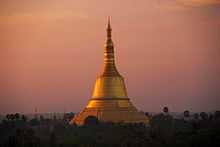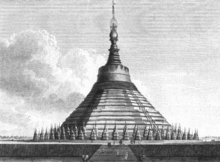Shwemawdaw Paya

The Shwemawdaw Paya (Burmese: ရွှေမောဓော ဘုရား [ʃwè mɔ̀dɔ́ pʰəjá]; Mon: ကျာ်မုဟ်တ [tɕaɪʔmṵtú]) is a stupa located in Bago, Myanmar. It is often referred to as the Golden God Temple. At 375 feet in height, the Shwemadaw holds the record for the tallest pagoda in the country although the Shwedagon Pagoda in Yangon is usually credited as the tallest pagoda in Myanmar (at 98 meters - approximately 321.5 ft). Shwemadaw, along with the Shwedagon and Kyaiktiyo, are famous Mon pagodas. The pagoda's annual festival is a 10 day affair that takes place during the Burmese month of Tagu.[1]
History

The Shwemawdaw Paya was originally built around the tenth century, C.E. It was destroyed several times due to earthquakes, including one in 1917 and another in 1930. Portions of the fallen pre-1917 version of the Paya remain at the site. The original version of the pagoda was approximately 70 feet tall, built by the Mon supposedly to hold two hairs of the Buddha. Allegedly, the hairs were given personally to two Mon merchants named Mahasala and Kullasala by the Buddha on a trip to India. Tooth relics were also added to the pagoda in 982 and 1385. Further additions to the temple include a bell from King Dhammazedi, a crown from King Bayinnaung, and a spire umbrella from King Bodawpaya. The current stupa, as of its most recent rebuilding, stands at 375 feet, making it the tallest in Myanmar.
Images
-

Shwemawdaw Paya Exterior
-

Old Hti which collapsed due to an earthquake in 1917
-

Shwemawdaw from Hintha Ghone
-

Sculpture at Shwemawdaw Paya
References
- ↑ Zaw Winn (28 April 2008). "Shwemawdaw Pagoda welcomes in the New Year". Myanmar Times. Retrieved 5 March 2012.
External links
| Wikimedia Commons has media related to Shwemawdaw Paya. |
Coordinates: 17°20′13″N 96°29′49″E / 17.3368744°N 96.496954°E